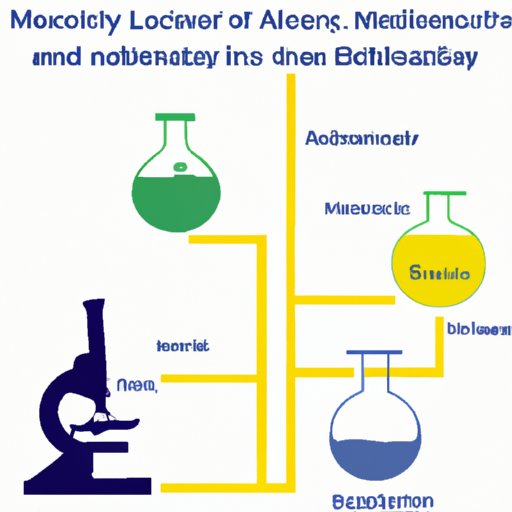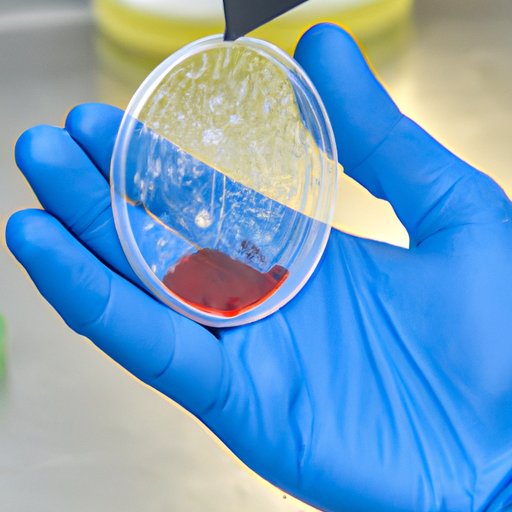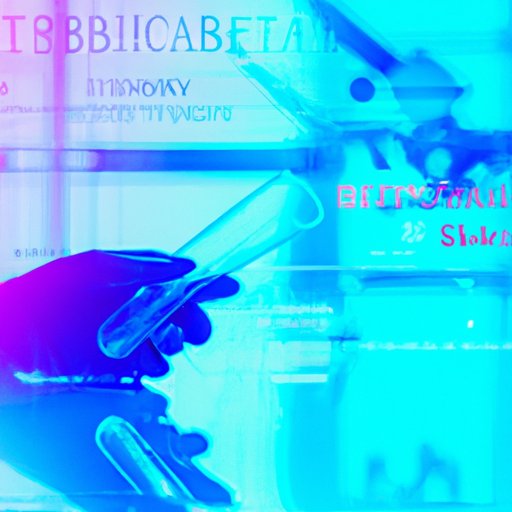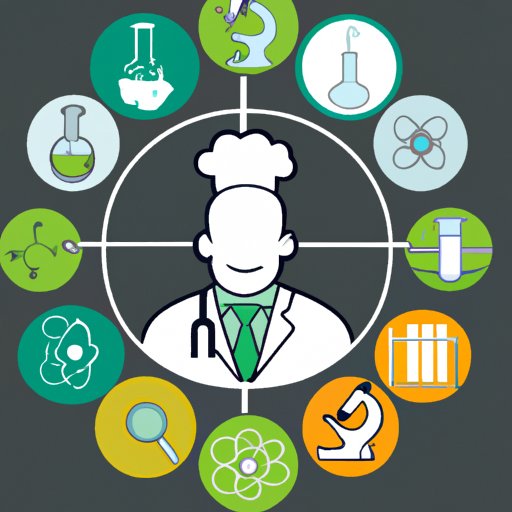Introduction
A Medical Laboratory Science (MLS) degree is a professional degree that prepares individuals for a career in laboratory medicine. It is an interdisciplinary field that combines science, technology, and medical knowledge in order to diagnose and treat diseases. As such, it is an essential component of modern healthcare.
Individuals who pursue a MLS degree are prepared to work in clinical, research, diagnostic, and teaching laboratories. The skills and knowledge gained from this degree can be applied in a variety of settings, from hospitals to universities. This article will explore the different career paths available to those with a MLS degree, as well as the educational requirements, job outlook, and impact of technology on the field.

Exploring the Different Career Paths of Medical Laboratory Scientists
Medical laboratory scientists are highly trained professionals who use sophisticated instruments and techniques to analyze biological specimens. They play a critical role in the diagnosis and treatment of disease by providing accurate and reliable laboratory results. There are many different career paths within the field of medical laboratory science, including:
Clinical Laboratory Scientist
Clinical laboratory scientists perform tests on biological specimens, such as blood and urine, to identify infection or disease. They analyze the results and interpret them to assist physicians in making diagnoses and developing treatment plans. Clinical laboratory scientists may also be responsible for operating and maintaining laboratory equipment, as well as training other laboratory personnel.
Cytotechnologist
Cytotechnologists specialize in examining cells and tissues to detect abnormalities, such as cancer. They use a microscope to examine slides prepared from patient samples, then report their findings to pathologists. Cytotechnologists may also be involved in preparing tissue samples for further testing.
Histotechnologist
Histotechnologists prepare tissue specimens for microscopic examination. This involves processing the tissue sample and staining it with dyes to make the cell structures more visible. Histotechnologists must have a thorough understanding of the anatomy and physiology of cells and tissues in order to accurately interpret the results.
Immunology/Serology Technologist
Immunology/serology technologists test patient samples for antibodies and antigens. These tests are used to diagnose and monitor conditions such as HIV and autoimmune diseases. Immunology/serology technologists must understand immunology and serology principles in order to accurately interpret the results.
Microbiologist
Microbiologists study microorganisms, such as bacteria, viruses, and fungi. They identify, isolate, and characterize these organisms in order to better understand their behavior and role in human health and disease. Microbiologists also develop tests to detect and identify infectious agents.
Molecular Biologist
Molecular biologists study the structure and function of genes and proteins. They use sophisticated techniques, such as DNA sequencing and PCR, to analyze genetic material. Molecular biologists may also be involved in gene therapy, drug development, and other biotechnology applications.
Understanding the Educational Requirements for a Medical Laboratory Science Degree
In order to pursue a career in medical laboratory science, individuals must complete a minimum of a bachelor’s degree in a related field. Prerequisites for this degree include courses in biology, chemistry, mathematics, and physics. Students must also complete a clinical laboratory science program, which typically includes coursework in hematology, immunology, microbiology, and clinical chemistry.
In addition to a bachelor’s degree, individuals may choose to pursue a master’s degree in medical laboratory science. This degree provides advanced training in laboratory techniques and management. It also increases job opportunities and salary potential.
Most states require medical laboratory scientists to be certified or licensed. Certification typically requires passing an exam administered by a recognized professional organization, such as the American Society for Clinical Pathology (ASCP). Licensure may also be required in some states, which typically involves passing a state-administered exam.

Investigating the Work Environment of a Medical Laboratory Scientist
Medical laboratory scientists typically work in hospital laboratories, private laboratories, and research facilities. They often work in teams, collaborating with other healthcare professionals to provide accurate and timely results. Depending on the type of laboratory, they may also be responsible for operating and maintaining laboratory equipment.
Medical laboratory scientists typically work in well-lit and ventilated areas. They must follow strict safety protocols, such as wearing protective clothing and using sterile procedures. They may also be exposed to hazardous materials, so it is important to take necessary precautions to avoid contamination.
Examining the Job Outlook for Medical Laboratory Scientists
According to the Bureau of Labor Statistics (BLS), employment of medical laboratory scientists is projected to grow 11 percent from 2019 to 2029, faster than the average for all occupations. This growth is due to an increased demand for medical laboratory services, as well as advances in technology that allow for more efficient and accurate testing.
The median annual wage for medical laboratory scientists was $52,330 in May 2019, according to the BLS. The lowest 10 percent earned less than $35,470, while the highest 10 percent earned more than $83,150. Salary may vary depending on experience, location, and type of employer.
Discovering the Impact of Medical Laboratory Science on Patient Care
Medical laboratory science plays an essential role in patient care. Laboratory tests are used to diagnose and monitor diseases, as well as to assess the effectiveness of treatments. Medical laboratory scientists are also responsible for ensuring the accuracy and reliability of test results, which can have a significant impact on patient outcomes.
In addition, medical laboratory scientists are involved in quality assurance and improvement processes. They ensure that laboratory equipment is functioning properly, as well as that proper protocols are being followed. This helps to ensure that patients receive accurate and timely results.

Highlighting Innovations in Medical Laboratory Science Technology
Advances in technology have had a profound impact on the field of medical laboratory science. Automation has made it possible to conduct more tests in less time, thus increasing efficiency and reducing costs. Precision medicine has also become increasingly important, as it allows for more personalized and targeted treatments based on genetic profiles.
In addition, new technologies, such as next-generation sequencing, have allowed for the identification of rare and novel genetic variants that may be associated with diseases. These advances have enabled medical laboratory scientists to provide more accurate and timely diagnosis and treatment.
Conclusion
The field of medical laboratory science offers many exciting and rewarding career paths. Individuals with a MLS degree can pursue a variety of roles, from clinical laboratory scientist to molecular biologist. The educational requirements for a MLS degree include prerequisites, a bachelor’s or master’s degree, and certification or licensure. Medical laboratory scientists typically work in hospital or research laboratories, and the job outlook is favorable with a median annual wage of $52,330.
Finally, medical laboratory science has a significant impact on patient care. Through accurate and reliable test results, medical laboratory scientists help to inform diagnosis and treatment decisions. In addition, they are involved in quality assurance and improvement processes to ensure the accuracy and reliability of test results. Finally, innovations in technology are revolutionizing the field, allowing for more efficient and accurate testing.
(Note: Is this article not meeting your expectations? Do you have knowledge or insights to share? Unlock new opportunities and expand your reach by joining our authors team. Click Registration to join us and share your expertise with our readers.)
